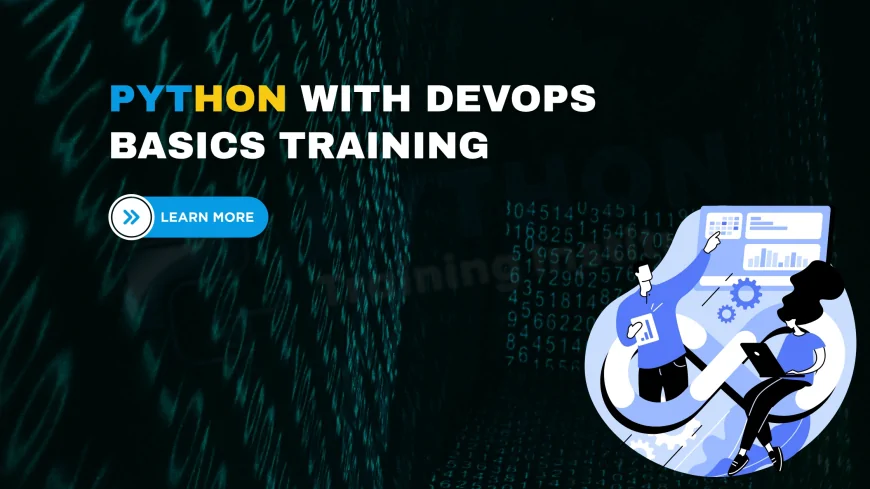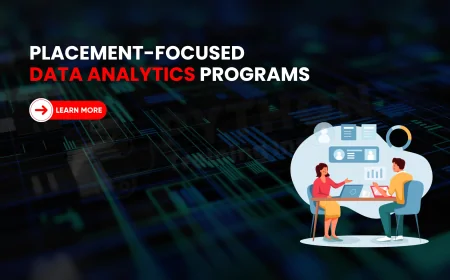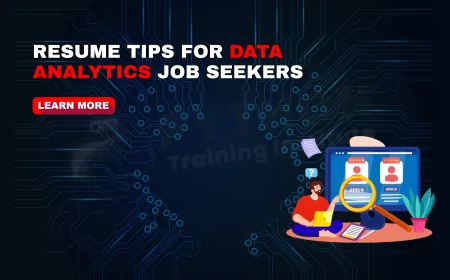Python Training Courses Including DevOps Basics Pune | DevOps Basics with Python: Training Programs in Pune
Join top-rated Python Training Courses including DevOps Basics in Pune. Learn automation, CI/CD pipelines, Docker, Jenkins, and cloud deployments with Python. Ideal for beginners and working professionals. Get certified and job-ready.

Table of Contents
- Introduction
- Why Learn Python with DevOps Basics?
- Key Skills You Will Learn
- Top Institutes Offering Python with DevOps in Pune
- Sample Course Curriculum
- Certification & Career Benefits
- Who Should Join These Courses?
- Modes, Duration & Fees
- Student Success Stories
- FAQs
- Conclusion
Introduction
Python has become the go-to programming language for automation, scripting, and application development. When combined with DevOps basics, it becomes a powerful skill set that employers demand. In Pune, a thriving IT and startup hub, Python training courses that integrate DevOps fundamentals are growing rapidly. These specialized courses equip learners with both coding skills and the ability to deploy, automate, and manage applications in cloud and CI/CD environments.
Why Learn Python with DevOps Basics?
Combining Python with DevOps basics is a game-changer in today's fast-paced tech industry. As companies demand more automation, faster deployment cycles, and efficient infrastructure management, professionals with skills in both Python and DevOps are highly sought after—especially in thriving IT cities like Pune.
- Automation Powerhouse: Python is one of the best languages for scripting automation workflows in DevOps environments, from configuration to deployment.
- Streamlined CI/CD Pipelines: Python integrates effortlessly with tools like Jenkins, Git, and GitHub Actions to build and deploy software rapidly and reliably.
- Cloud-Native Compatibility: Python works smoothly with AWS, Azure, GCP, and Terraform, making it essential for DevOps engineers working in cloud infrastructure.
- Tool Integration: From Docker and Kubernetes to Ansible and Prometheus, Python can interact with nearly every major DevOps tool.
- Faster Career Growth: Professionals skilled in both Python and DevOps are eligible for roles like Site Reliability Engineer (SRE), Automation Engineer, and Cloud DevOps Engineer.
- Ideal for Beginners: Python’s simple syntax and massive community support make it easier to learn and apply in DevOps use cases quickly.
- Demand in Pune Tech Market: Leading companies and startups in Pune are hiring professionals with combined skills in Python programming and DevOps methodologies.
Learning Python along with DevOps basics not only opens up a wide array of job opportunities but also provides the ability to automate and manage complex systems efficiently—making you a valuable asset in any IT team.
Key Skills You Will Learn
Enrolling in Python Training Courses that include DevOps basics in Pune equips you with a well-rounded skillset to meet the growing demands of modern software delivery and infrastructure automation. Here are the essential technical and practical skills you’ll gain:
- Python Programming: Core syntax, data types, functions, modules, object-oriented programming (OOP), and scripting for real-world applications.
- Version Control with Git: Track changes in your codebase, collaborate in teams, and manage repositories using Git and GitHub.
- Linux & Shell Scripting: Command-line navigation, bash scripting, and process management—critical for DevOps environments.
- DevOps Fundamentals: Learn the principles of Continuous Integration (CI), Continuous Delivery/Deployment (CD), and Infrastructure as Code (IaC).
- CI/CD Pipelines: Build and automate end-to-end software delivery pipelines using Jenkins, GitHub Actions, or GitLab CI.
- Docker & Containers: Create, manage, and deploy containerized applications for scalable microservices architecture.
- Kubernetes Basics: Understand orchestration, pods, deployments, and cluster management using Kubernetes.
- Infrastructure as Code (IaC): Use tools like Terraform or Ansible to provision and manage infrastructure programmatically.
- Monitoring & Logging: Implement observability practices using Prometheus, Grafana, ELK stack, or similar tools.
- Cloud Integration: Hands-on with AWS, Azure, or GCP to deploy applications, manage resources, and automate tasks using Python.
- Test Automation: Learn unit testing, integration testing, and build test scripts using Python frameworks like PyTest or Unittest.
These skills will help you confidently step into job roles like DevOps Engineer, Python Automation Engineer, Site Reliability Engineer (SRE), or Cloud Infrastructure Engineer in Pune and beyond.
Top Institutes Offering Python with DevOps in Pune
| Institute | Highlights | Certifications |
|---|---|---|
| Webasha Technologies | Hands-on Python + DevOps, live projects, weekend & weekday batches | Python DevOps Certification |
Sample Course Curriculum
- Week 1–2: Python Basics, Data Structures, Functions
- Week 3: Linux & Bash for DevOps
- Week 4: Git, GitHub, and Agile Practices
- Week 5–6: Jenkins Setup, Python CI Pipelines
- Week 7: Docker & Docker Compose with Python APIs
- Week 8: Kubernetes Deployment
- Week 9: AWS CLI, Boto3 Python SDK
- Week 10: Real-Time DevOps Projects with Monitoring Tools
Certification & Career Benefits
After completing the course, you will receive an industry-recognized certificate that validates your skills in both Python development and DevOps practices. Certified candidates can expect:
- 20% higher salary packages
- Priority in technical interviews
- Eligibility for mid-level to advanced roles in cloud teams
- Freelancing or DevOps consultancy options
Who Should Join These Courses?
Python Training Courses including DevOps Basics in Pune are ideal for a wide range of learners, from absolute beginners to professionals aiming to upskill. Whether you're targeting software automation, deployment, or full-stack DevOps, this course is designed to accelerate your career path.
- Fresh Graduates in Computer Science or IT: Build a strong foundation in programming and DevOps for your first job in tech.
- Working Professionals in IT: Transition from manual tasks to automation and cloud operations using Python and DevOps tools.
- System Administrators: Learn infrastructure automation and container management to move into DevOps roles.
- QA/Test Engineers: Upgrade to Python automation and CI/CD integration for modern software testing workflows.
- Software Developers: Understand how to deploy, monitor, and manage applications across multiple environments using DevOps practices.
- Freelancers & Consultants: Offer end-to-end automation and cloud deployment services using Python and DevOps tools.
- Entrepreneurs & Startup Founders: Gain technical skills to manage product development pipelines and cloud hosting in-house.
- Career Switchers: Professionals from non-tech backgrounds looking to enter the booming DevOps and cloud space through Python.
These courses are structured to accommodate varied schedules, offering weekend, evening, and online options for flexible learning in Pune.
Modes, Duration & Fees
| Mode | Duration | Typical Fee (INR) |
|---|---|---|
| Online Instructor-Led | 8–12 Weeks | ₹15,000 – ₹30,000 |
| Offline Classroom | 10 Weeks | ₹18,000 – ₹35,000 |
| Weekend Batch | 12–14 Weeks | ₹12,000 – ₹25,000 |
Student Success Stories
Rohit K. (Infosys Pune): “This course helped me transition from manual QA to DevOps automation within 3 months. The combination of Python and cloud tools gave me a massive edge.”
Anjali M. (Startup DevOps Lead): “The live project on Docker and Jenkins helped me crack three job offers. Highly recommended for aspiring DevOps engineers in Pune!”
FAQs
1. What is Python used for in DevOps?
Python is used for automation scripts, CI/CD pipelines, cloud deployment, monitoring, and writing infrastructure code in DevOps workflows.
2. Are Python and DevOps taught together in these courses?
Yes, these courses integrate DevOps concepts like Git, Docker, Jenkins, and Kubernetes alongside Python programming.
3. Is this course beginner-friendly?
Absolutely. No prior coding or DevOps experience is required. The course starts with Python basics and gradually covers DevOps tools.
4. What tools will I learn in a Python DevOps course?
Git, Docker, Jenkins, Kubernetes, Terraform, AWS CLI, Boto3, and Linux shell scripting.
5. Do I get a certificate after completing the course?
Yes, most institutes provide recognized certification upon successful completion and assessment.
6. Is placement assistance available?
Yes, most institutes in Pune offer placement help, resume building, and mock interviews.
7. Can I pursue this course part-time?
Yes, many institutes offer evening and weekend batches ideal for working professionals.
8. What is the average salary after this course?
Entry-level roles start around ₹4–6 LPA, while experienced candidates can earn ₹10–15 LPA+.
9. Is this training online or offline?
Both options are available—choose according to your preference and convenience.
10. Which cloud platform will be taught?
Primarily AWS, but some institutes also include basics of Azure and GCP.
11. Will I get hands-on practice?
Yes, expect 70–80% hands-on lab work, including live projects and simulations.
12. How do I enroll in these courses?
You can visit the official websites of institutes or contact them directly for batch schedules.
13. Is DevOps coding-heavy?
Not necessarily. With Python, you only need to write scripts—not build full-fledged software.
14. Can I take this course after 12th?
It’s better suited for graduates or diploma holders in IT or engineering fields.
15. Are live projects included?
Yes, institutes include 1–2 major DevOps projects such as building CI/CD pipelines or deploying containerized apps.
16. Is this course suitable for QA testers?
Yes, especially for those transitioning to automation or DevOps testing roles.
17. Will Python alone help in DevOps?
Python simplifies automation, but pairing it with tools like Git, Docker, and Jenkins completes the DevOps workflow.
18. Are weekend-only batches available?
Yes, weekend courses are available for working professionals in Pune.
19. How long will it take to become job-ready?
Typically 10–12 weeks of focused training and hands-on practice is enough to become job-ready.
20. Can I build a career in cloud DevOps after this course?
Yes, this course provides the foundation for roles like AWS DevOps Engineer, Python Automation Specialist, and SRE.
Conclusion
The IT industry is rapidly shifting towards automation, containerization, and continuous deployment. Learning Python with DevOps basics gives you a strong technical advantage, especially in Pune’s ever-evolving tech ecosystem. Whether you aim to become a cloud engineer, DevOps specialist, or Python developer, this dual-focused course opens up multiple high-paying career paths. Now is the best time to enroll and future-proof your career with one of the top institutes offering job-oriented training in Pune.
What's Your Reaction?
 Like
0
Like
0
 Dislike
0
Dislike
0
 Love
0
Love
0
 Funny
0
Funny
0
 Angry
0
Angry
0
 Sad
0
Sad
0
 Wow
0
Wow
0













